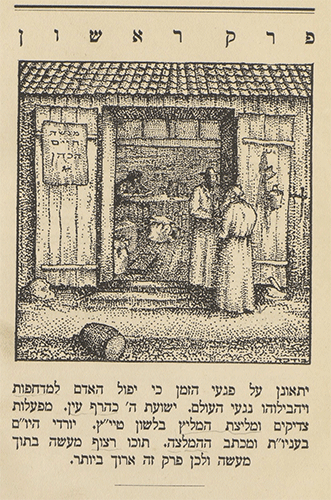76 Modern Hebrew

ורבים מצאו שראוי לתמוך בה ואין פוצה פה כנגד המצוה הזאת. אפס לכלל מעשה לא באו, חס ושלום שאנשי בוצץ מתרפים מדבר מצוה להתעסק בה, אבל כלל זה מסור בידם כל שאפשר לעשותו מחר אפשר לדחותו גם למחרתיים ויש מחרתיים לאחר זמן. וכשבאו ואמרו לפרנס החודש קריינדל טשרני גוועת ברעב ענה ואמר באמת באמת קריינדל טשרני גוועת ברעב.
And many saw fit to support her and none objected to this mitzvah. But they failed to act. Heaven forbid that the people of Buczacz would neglect performing a mitzvah, but this was their fixed rule: whatever can be done tomorrow can be put off to the day after tomorrow, and there is another tomorrow after that. And when they came and said to the month’s community head, “Kreindel Tcharny is dying of hunger,” he responded, “Really, really, Kreindel Tcharny is dying of hunger.” (trans. Robert Alter)
The novella And the Crooked Shall be Straight, which appeared in 1912, a year before the 24-year-old Agnon left Palestine for what would prove a decade-long stay in Germany, established his reputation as a major new voice in Hebrew literature. In it, he perfected his signature style, a supple and resonant synthesis of early rabbinic Hebrew, the Hebrew of the medieval commentaries, and the language of Early Modern pious literature. The power of the story came across in translation as well: Walter Benjamin, destined to become one of the most original critics of his age, read it in the 1919 German version together with other stories and deemed Agnon a great writer.
The plot is one that had some currency among European writers — one thinks of Balzac’s Colonel Chabert, the story of an officer in Napoleon’s army presumed dead in battle who after some years returns home to find his wife married to another man, like the protagonist of Agnon’s novella. The abundant deployment of traditional Hebrew sources here is shrewdly ironic. The title itself, a quotation from Isaiah 40:4, is turned back on itself because in the story nothing tragically bent will be made straight. The citation of a well-known talmudic dictum, “A poor man is as good as dead,” acquires a new, macabre meaning. The original sense is that a poor man is so miserable and so ill-regarded that he might as well be dead. But Agnon’s Menashe Haim — his name means “life-forgetter” — becomes a living dead man. After he sells his mendicant’s rabbinic letter of recommendation, the buyer is found dead with the seller’s name on the letter; his grave is marked with a tombstone bearing Menashe Haim’s name; his wife, who had been childless, has a baby with her new husband; and Menashe Haim, discovering this, retreats to olam hatohu, a borderline realm between life and death, in the end living in a cemetery. All this is a naturalistic adaptation of Gothic fiction, to which Agnon was drawn, populated by wandering souls, revenants, and ghosts. Perhaps the one unironic allusion to a traditional text is to Qohelet (Ecclesiastes), recurring in the story. At one point, the narrator says, “As the rhapsode (hameilitz) Schiller has said, “A generation comes and a generation goes but hope endures forever.” Whether Schiller actually said this, a one-word substitution has been made in the quotation of Qohelet 1:4, which reads, “A generation comes and a generation goes but the world endures forever.” In Menashe Haim’s story, hope is a mockery. One may recall Kafka’s somber remark, “There is hope but not for us.”
Contribution by Robert Alter
Emeritus Professor of Hebrew and Comparative Literature,
Department of Near Eastern Studies
Title in English: And the Crooked Shall be Straight
Author: Agnon, Shmuel Yosef, 1887-1970; Illustrated by Joseph Budko.
Imprint: Berlin, Jüdischer Verlag, 1919.
Edition: n/a
Language: Modern Hebrew
Language Family: Afro-Asiatic, Northwest Semitic
Source: HathiTrust Digital Library (University of Maryland, College Park)
URL: https://hdl.handle.net/2027/umd.31430057918973
Other online editions:
- Und das Krumme wird gerade: Geschichte eines Menschen mit Namen Menaschen Chajim … / das hat verfasst und hat es aufgeschrieben G.S. Agnon; [aus dem Hebräischen von Max Strauss]. Berlin: Jüdische Verlag, 1920.
Select print editions at Berkeley:
- Ṿe-hayah he-ʻaḳov le-mishor / be-tseruf heʻarot, beʼurim u-marʼe meḳomot me-et Naftali Ginaton. Yerushalayim: Shoḳen, 1965.
- Sipurim: Ṿe-hayah he-ʻaḳov la-mishor; Tehilah. Yerushalayim: Shoḳen, 723, 1963.
Explore Modern Hebrew language and literature at UC Berkeley:
- Learn Hebrew with Rutie Adler
- Study Modern Hebrew literature with Chana Kronfeld
- Choose the undergraduate Minor in Hebrew
- Pursue advanced study in UCB’s Near Eastern Studies and Comparative Literature graduate programs in Hebrew and Hebrew literature

